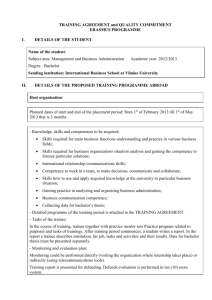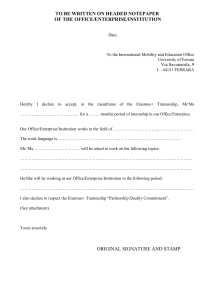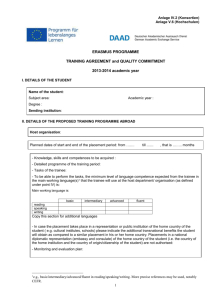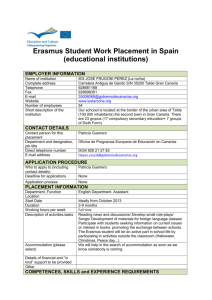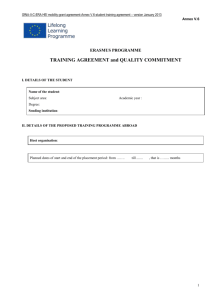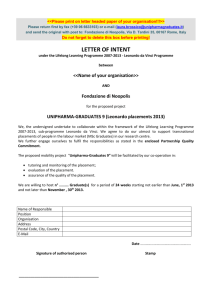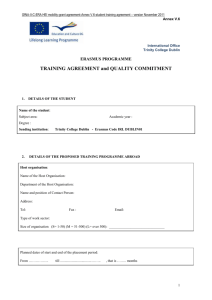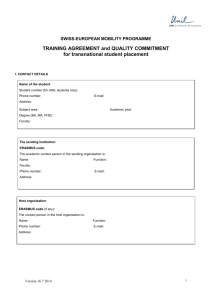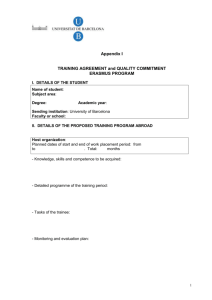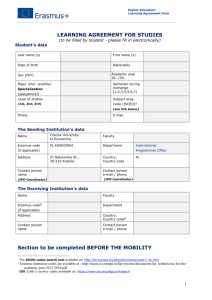Training Agreement
advertisement
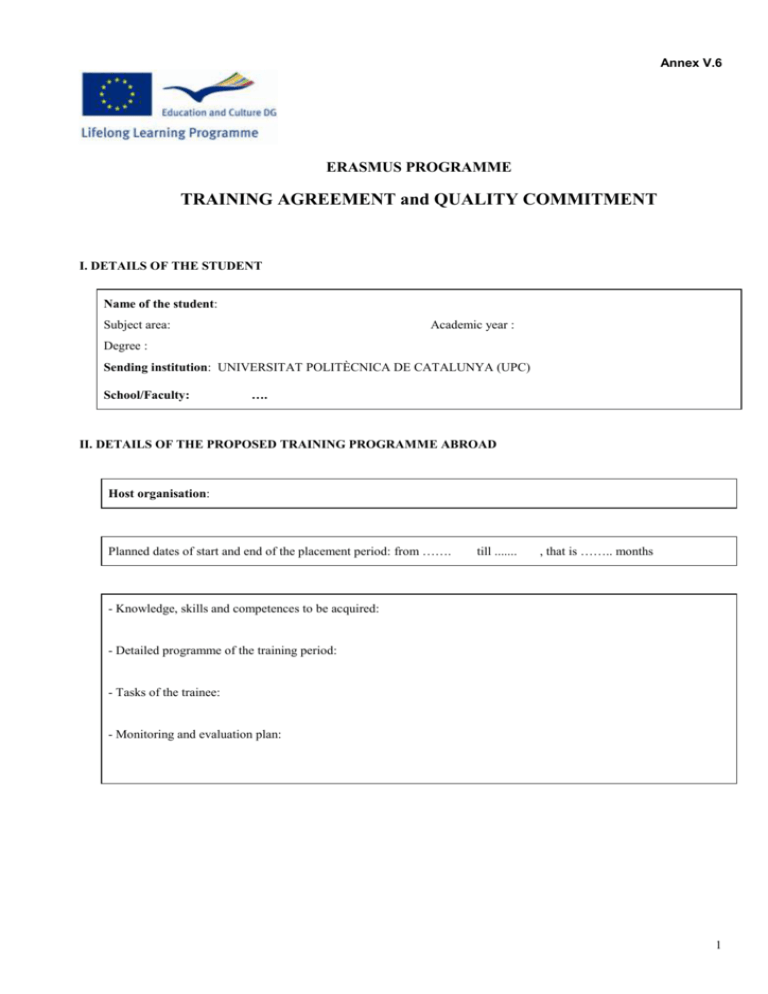
Annex V.6 ERASMUS PROGRAMME TRAINING AGREEMENT and QUALITY COMMITMENT I. DETAILS OF THE STUDENT Name of the student: Subject area: Academic year : Degree : Sending institution: UNIVERSITAT POLITÈCNICA DE CATALUNYA (UPC) School/Faculty: …. II. DETAILS OF THE PROPOSED TRAINING PROGRAMME ABROAD Host organisation: Planned dates of start and end of the placement period: from ……. till ....... , that is …….. months - Knowledge, skills and competences to be acquired: - Detailed programme of the training period: - Tasks of the trainee: - Monitoring and evaluation plan: 1 III. INFORMATION on THE PARTNER HIGHER EDUCATION INSTITUTION in the HOST COUNTRY or on the coordinator of the consortium (OPTIONAL) Whilst keeping full responsibility for the placement and for any modification to this agreement, the sending institution has a [local] [strike out if not applicable for the consortium which might provide support without having a local branch in the host country] partnership with [to be filled in with the name of the partner higher education institution/name of the coordinator of the consortium] in view of helping with the monitoring of the mobility abroad. All parties will keep the sending institution informed of their exchanges. The contact person in the partner institution is: Name: Function: Phone number: E-mail: Address: IV. COMMITMENT OF THE THREE PARTIES By signing this document the student, the sending institution and the host organisation confirm that they will abide by the principles of the Quality Commitment for Erasmus student placements set out in the document below. The student Student’s signature ........................................................................... Date: The sending institution We confirm that this proposed training programme agreement is approved. The placement is part of the curricula Yes/No (*). On satisfactory completion of the training programme the institution will [please indicate how the placement will be recognised. There should at least be one positive answer]: - award ECTS credits Yes/No (*) If yes: number of ECTS credits: - and/or (*) record the training period in the Diploma Supplement Yes/No (*) or if not possible record it in the student's transcript of records Yes/No In addition , the mobility period will documented in the Europass mobility document Yes/No (*) Coordinator’s name and function Date: ................................................................... Coordinator’s signature (*) (please strike out the non applicable answer) 2 The host organisation The student will receive a financial support for his/her placement The student will receive a contribution in kind for his/her placement Yes Yes No No Name and position of the mentor (if not available, the name shall be communicated to the student upon his/her arrival ): Number of permanent staff in the department (team) hosting the student: Number of other students/trainees hosted at the same time in the department (team) hosting the student: We confirm that this proposed training programme is approved. On completion of the training programme the organisation will issue a Certificate to the student Coordinator’s name and function ................................................................... Date: ................................................................... Coordinator’s signature .............................................................................. 3 QUALITY COMMITMENT For Erasmus student placements This Quality Commitment replicates the principles of the European Quality Charter for Mobility THE SENDING HIGHER EDUCATION INSTITUTION* UNDERTAKES TO: Define the learning outcomes of the placement in terms of the knowledge, skills and competencies to be acquired Assist the student in choosing the appropriate host organisation, project duration and placement content to achieve these learning outcomes Select students on the basis of clearly defined and transparent criteria and procedures and sign a placement contract with the selected students. Prepare students for the practical, professional and cultural life of the host country, in particular through language training tailored to meet their occupational needs Provide logistical support to students concerning travel arrangements, visa, accommodation, residence or work permits and social security cover and insurance Give full recognition to the student for satisfactory completed activities specified in the Training Agreement Evaluate with each student the personal and professional development achieved through participation in the Erasmus programme THE SENDING INSTITUTION* AND HOST ORGANISATION JOINTLY UNDERTAKE TO: Negotiate and agree a tailor-made Training Agreement (including the programme of the placement and the recognition arrangements) for each student and the adequate mentoring arrangements Monitor the progress of the placement and take appropriate action if required THE HOST ORGANISATION UNDERTAKES TO: Assign to students tasks and responsibilities (as stipulated in the Training Agreement) to match their knowledge, skills, competencies and training objectives and ensure that appropriate equipment and support is available Draw a contract or equivalent document for the placement in accordance with the requirements of the national legislation Appoint a mentor to advise students, help them with their integration in the host environment and monitor their training progress Provide practical support if required, check appropriate insurance cover and facilitate understanding of the culture of the host country THE STUDENT UNDERTAKES TO: Comply with all arrangements negotiated for his/her placement and to do his/her best to make the placement a success Abide by the rules and regulations of the host organisation, its normal working hours, code of conduct and rules of confidentiality Communicate with the sending institution about any problem or changes regarding the placement Submit a report in the specified format and any required supporting documents at the end of the placement * In the event that the higher education institution is integrated in a consortium, its commitments may be shared with the coordinating organisation of the consortium 4

